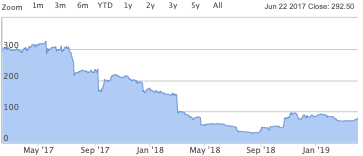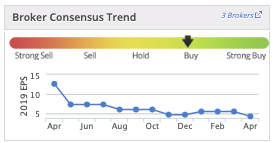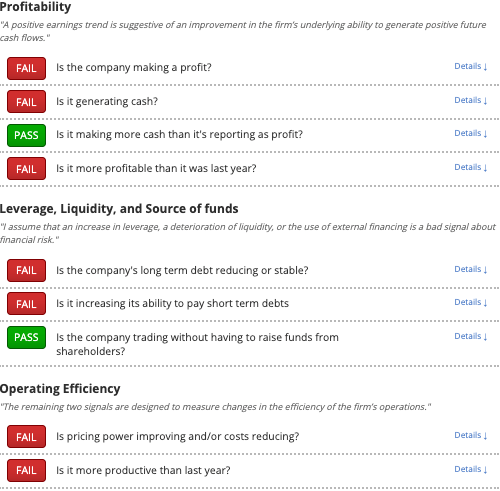Why you need to look at Safestyle Uk's (LON:SFE) Piotroski F-Score
Safestyle Uk (LON:SFE) is a United Kingdom-based company engaged in the sale, manufacture and installation of replacement un-plasticized polyvinyl chloride (PVCu) windows and doors, with segments including the sale, design, manufacture, installation and maintenance of domestic, double-glazed, replacement windows and doors.
The group has run into trouble recently as a result of a direct competitor taking market share, although Safestyle is looking to bounce back. For the fiscal year ended 31 December 2018, Safestyle UK PLC revenues decreased 27% to £116.4M and net loss totaled £13.3M (vs income of £10.8M in the prior period). We can see the impact of this decline in financial performance on the group's share price over the past two years:

And also in the downwards trend in forecast EPS from its three brokers over the past year:

Unfortunately, applying the Piotroski F-Score to this small cap doesn't do much to dispell these concerns... We'll get into this later, but first a quick refresher on what the F-Score means.
The Piotroski F-Score: one indicator to rule them all?
The Piotroski F-Score is a nine-strong checklist split up into three sections, each looking at a different part of a company's financial situation. Its secret sauce is that, unlike most ratios, the F-Score looks more deeply into the direction in which a company’s financial health is moving. Keeping on top of these trends can help us stay ahead of the game.
When a stock gets beaten down it ends up in the bargain basement of the stock market. From here there are generally three outcomes. The stock either:
- Stumbles along, zombie-like,
- Tumbles into administration, or
- Recovers emphatically
Stanford Finance Professor Joseph Piotroski wanted to sort the wheat from the chaff. After settling on the F-Score, he produced some astonishing results.
Why the F-Score does not like Safestyle Uk (LON:SFE)
Piotroski found that weak stocks with an F-Score of 2 or less are five times more likely to either go bankrupt or delist due to financial problems. Working our way through Piotroski's checklist, we can see that Safestyle Uk gets a lowly F-Score of 2 out of a possible 9. Food for thought for anyone looking to hold onto their money. We can see which areas of the checklist Safestyle Uk fails in the graphic below:

Fortify your portfolio with simple, effective tools
The problem areas for Safestyle UK identified here can be explored in more depth on Stockopedia's research platform. All the best investors have stringent due diligence processes that reduce the chances of them suffering big losses, so why not take a leaf out of their book?
Simple tools can help us better measure and understand the risks we take. That's why the Stockopedia team has been busy building new ways of understanding investment risks and company characteristics. In this webinar, we talk about two or our most popular innovations: StockRank Styles and RiskRatings. These indicators transform a ton of vital financial information into intuitive classifications, allowing you to get an instant feel for any company on any market - sign up for a free trial to see how your stocks stack up.
About us
Stockopedia helps individual investors make confident, profitable choices in the stock market. Our StockRank and factor investing toolbox unlocks institutional-quality insights into thousands of global stocks. Voted “Best Investment Research Tools” and “Best Research Service” at the 2021 UK Investor Magazine awards.
